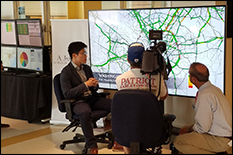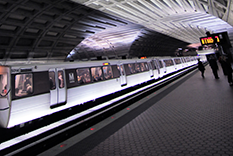News Story
UMD Transportation Experts in the News: WMATA’s SafeTrack Plan
As D.C.-area commuters experience Metrorail single-tracking and station closures, University of Maryland (UMD) transportation experts at the National Transportation Center (NTC@Maryland) and Center for Advanced Transportation Technology Laboratory (CATT Lab) are using transportation modeling and simulation technologies to enable commuters to make informed decisions while the Washington Metropolitan Area Transit Authority (WMATA) SafeTrack plan is in effect.
On June 4, 2016, WMATA began implementing a track work plan centered on 15 “Safety Surge” periods and expanded weekday maintenance opportunities, extending into 2017. On an average weekday, more than 712,000 passengers board a Metrorail train, according to 2015 data reported by WMATA. WMATA has encouraged Metrorail riders to consider using alternate travel options while safety surge work is scheduled on their line. This could translate into increased use of buses, an uptick in traffic volume, and increased demand for car and bike share services.
NTC@Maryland Director Lei Zhang noted that WMATA's SafeTrack plan presents a unique opportunity for transportation engineers. Unlike day-to-day occurences - such as breakdowns or weather events - SafeTrack's maintenance schedule allows engineers an opportunity to analyze commuter behaviors over a prolonged period of time. Even more, NTC@Maryland researchers are conducting surveys before and after each SafeTrack phase to measure how affected travelers plan to adjust their commutes compares with actual traveler behaviors.
"We've seen a lot of evidence of inertia," Zhang told UMD's Terp. "A lot of people don’t want to use other modes until it really hurts them."
Recent media coverage of UMD's transportation SafeTrack research is below:
- WUSA 9, Predicting the future of traffic from Metro slowdown. June 1, 2016.
- The Washington Times, ‘SafeTrack’ headaches: D.C. steels for gnarly Monday commute as massive Metro overhaul begins. June 2, 2016.
- WTOP, Experts weigh in on impact of Metro maintenance surge. June 2, 2016.
- The Washington Post, How Metro’s SafeTrack plan could affect your commute if you drive. June 5, 2016.
- Politico, Morning Transportation. June 6, 2016.
- Terp, Tracking the Tracks. June 21, 2016.
- DCInno, Metro's SafeTrack Shutdown Is Ride-Share Carpooling's Moment. June 21, 2016.
- WUSA9, Do SafeTrack shutdowns impact highway traffic? July 7, 2016.
The A. James Clark School of Engineering at the University of Maryland serves as the catalyst for high-quality research, innovation, and learning, delivering on a promise that all graduates will leave ready to impact the Grand Challenges (energy, environment, security, and human health) of the 21st century. The Clark School is dedicated to leading and transforming the engineering discipline and profession, to accelerating entrepreneurship, and to transforming research and learning activities into new innovations that benefit millions. Visit us online at www.eng.umd.edu and follow us on Twitter @ClarkSchool.
Published June 6, 2016












